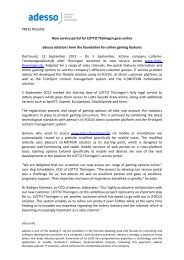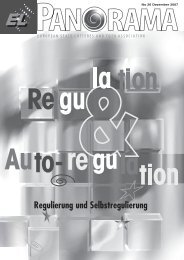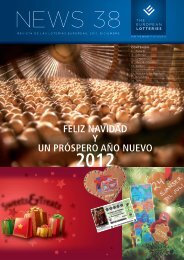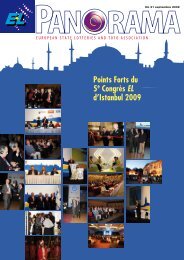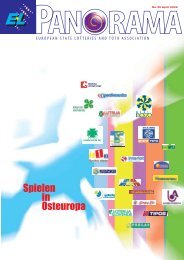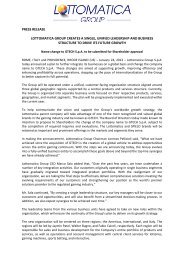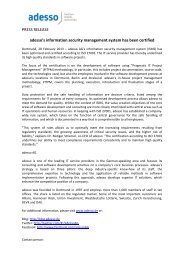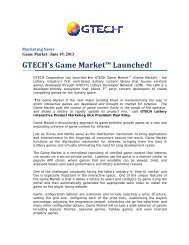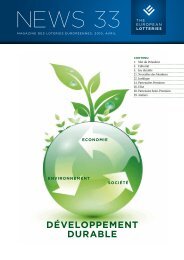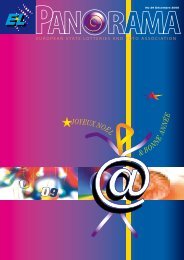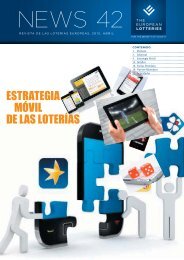MAGAZINE OF THE EUROPEAN LOTTERIES, 2011, SEPTEMBER ...
MAGAZINE OF THE EUROPEAN LOTTERIES, 2011, SEPTEMBER ...
MAGAZINE OF THE EUROPEAN LOTTERIES, 2011, SEPTEMBER ...
Create successful ePaper yourself
Turn your PDF publications into a flip-book with our unique Google optimized e-Paper software.
GAMBLING TECHNOLOGIES<br />
Gambling Technology is a fundamental<br />
topic today, especially in the light of<br />
the ongoing debate in the EU. Various<br />
notifications by Member States<br />
refer to IT aspects while also the EU<br />
Commission Green Paper consultation<br />
on the sector of online gambling is<br />
paying a particular attention to it.<br />
The actual debate on gambling<br />
technologies is driven by the way<br />
technology is used in a proper regulated<br />
environment in order to avoid the abuse<br />
of the principles of the Internal Market.<br />
Technology is often used to circumvent<br />
the principles of Internal Market rules,<br />
to avoid taxation and the application of<br />
anti-money laundering rules.<br />
In this regard, Advocate General P.<br />
Mengozzi, in its Opinion in the Stoß<br />
case, has highlighted the existence<br />
of some practises which do not allow<br />
mutual trust between the EU Member<br />
States (i.e. off-shore licenses) and<br />
therefore result as a violation of Internal<br />
Market rules.<br />
P. Mengozzi clarifies that the<br />
application of the principle of mutual<br />
recognition presumes a certain balance<br />
to be found between the different<br />
conditions imposed in the Member<br />
States. Consequently, the Member<br />
State in which the service is provided<br />
cannot impose on the operator the<br />
same conditions and controls to which<br />
he was already subject in his country of<br />
origin.<br />
According to AG P. Mengozzi,<br />
extraterritorial licenses do not fulfil<br />
these conditions. Since the authorities<br />
of the country of origin do not allow the<br />
provision of gambling services within<br />
their territory, it cannot be argued that<br />
the general interest objectives pursued<br />
by another Member State are already<br />
sufficiently protected.<br />
The Court of Justice did reject in several<br />
cases the possibility in the current<br />
status of EU law the application of the<br />
mutual recognition. According to the<br />
Court “a Member State is therefore<br />
entitled to take the view that the mere<br />
fact that an operator such as Bwin<br />
lawfully offers services in that sector via<br />
the Internet in another Member State,<br />
in which it is established and where it is<br />
in principle already subject to statutory<br />
conditions and controls on the part of<br />
the competent authorities in that State,<br />
cannot be regarded as amounting to<br />
a sufficient assurance that national<br />
consumers will be protected against the<br />
risks of fraud and crime, in the light of<br />
the difficulties liable to be encountered<br />
in such a context by the authorities of<br />
the Member State of establishment in<br />
assessing the professional qualities and<br />
integrity of operators.”<br />
It is clear that this does also apply to the<br />
technology requirements which vary<br />
among the different Member States.<br />
Member States do rightly believe<br />
that, in order to be able to uphold a<br />
proportionate and consistent gambling<br />
policy technology, means used should<br />
be subject to regular inspections and<br />
controls. This requirement is also<br />
foreseen in the Third Anti-Money<br />
Laundering Directive. Various systems<br />
are currently explored from a full<br />
(operational) server approach to a<br />
frontal system or a portal under control<br />
of the regulator. All those system<br />
are complemented by ISP and other<br />
blocking mechanisms to assist with the<br />
enforcement of the licensing regime.<br />
In the Dickinger case the question of<br />
mutual recognition and the difficulties<br />
LEGAL<br />
Philippe Vlaemminck<br />
18 NEWS 37 <strong>SEPTEMBER</strong> <strong>2011</strong><br />
relating to controls by the country of<br />
origin were again debated.<br />
In its opinion AG Bot expressed a rather<br />
critical view towards Malta regarding<br />
the abuse of Internal Market rules.<br />
According to Bot, Member States can<br />
impose strict requirements, including<br />
having a social seat within the territory<br />
of that Member State and a server to<br />
properly track and control the online<br />
gaming operations, in order to ensure a<br />
strict and more efficient control by the<br />
government of the operator’s policy.<br />
Consumer protection emerges here<br />
as the main issue in the debate. The<br />
absence of cooperation between<br />
Member States and of certain common<br />
IT standards creates some specific risks.<br />
In practice, self exclusions systems set<br />
up by a Member State, remain without<br />
effect in other Member States.<br />
More in general, a lack of understanding<br />
about technology can be detected,<br />
including at the level of the EU<br />
Commission.




